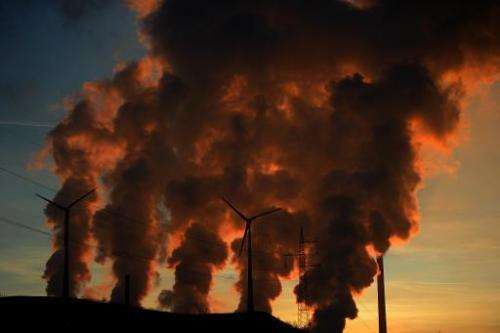Deep divisions as climate talks enter final stretch

UN climate talks enter their penultimate day in Warsaw on Thursday with divisions deeply entrenched between rich and poor nations on who must do what to curb planet warming.
As UN chief Ban Ki-moon called Wednesday for "much bolder" action to stave off an existential peril, the two sides squabbled over funding for poor nations to deal with climate change, and apportioning targets for curbing atmosphere-polluting greenhouse gas emissions.
"Climate change is the greatest single threat to peace, prosperity and sustainable development," Ban told squabbling negotiators in the Polish capital.
Dozens of ministers attended a special meeting on finance on Wednesday, as work continued laboriously in other rooms late into the night on a global pact that must be sealed by the end of 2015.
The deal must roll back fossil fuel emissions to limit climate damage for future generations, and bolster poor countries exposed to worsening storms, floods, droughts and rising seas.
Some observers and delegates say the talks are badly deadlocked, particularly over money.
Developing nations are challenging wealthy countries to honour a 2009 pledge to muster up to $100 billion (74 billion euros) by 2020, up from $10 billion a year from 2010 to 2012.
"Unless that is provided for, it will be impossible for us to take forward any meaningful discussion and we feel the negotiations will be rendered completely meaningless," Indian Environment Minister Jayanthi Natarajan said Wednesday.
Still struggling with an economic crisis, the developed world is wary of unveiling a point-by-point plan at this stage, or pledging any new short-term figures.
The money crunch also lies at the heart of another issue bedevilling the talks: demands by developing countries for a mechanism to help them deal with climate-related losses and damage.
Rich nations fear being locked into never-ending liability for compensation and are opposing the creation of a new structure outside of existing mechanisms to help nations adapt to the effects of climate change.
Another deep-seated and longstanding point of contention is deciding how to share out future emissions curbs.
Developing countries want wealthy nations to take on a bigger share of the responsibility to make up for a long history of fossil fuel combustion, while the West insists that emerging economies must do their fair share.
Having powered the economic growth of the West ever since the Industrial Revolution, the biggest rise today is in developing countries with plentiful, cheap reserves.
China is the world's biggest emitter of CO2 today, with India in fourth place after the United States and Europe.
Observers say negotiators have also yet to make any progress on drafting a timeline for arriving at the new deal in 2015.
© 2013 AFP




















